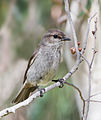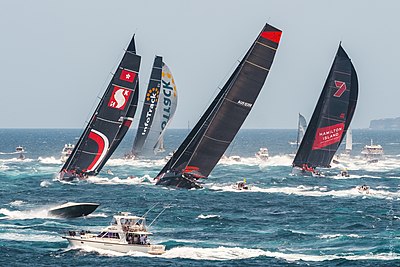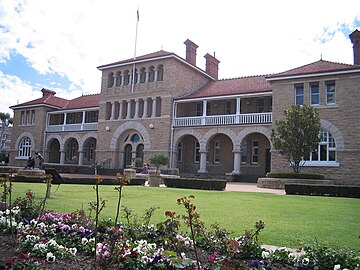Portal:Australia
| Showcase | Content | Interesting facts | Contributing |
Introduction

Australia, officially the Commonwealth of Australia, is a country comprising the mainland of the Australian continent, the island of Tasmania and numerous smaller islands. Australia has a total area of 7,688,287 km2 (2,968,464 sq mi), making it the sixth-largest country in the world and the largest country by area in Oceania. It is the world's oldest, flattest, and driest inhabited continent, with some of the least fertile soils. It is a megadiverse country, and its size gives it a wide variety of landscapes and climates including deserts in the interior and tropical rainforests along the coast.
The ancestors of Aboriginal Australians began arriving from south-east Asia 50,000 to 65,000 years ago, during the last glacial period. They settled on the continent and formed approximately 250 distinct language groups by the time of European settlement, maintaining some of the longest known continuing artistic and religious traditions in the world. Australia's written history commenced with Dutch exploration of most of the coastline in the 17th-century. British colonisation began in 1788 with the establishment of the penal colony of New South Wales. By the mid-19th century, most of the continent had been explored by European settlers and five additional self-governing British colonies were established, each gaining responsible government by 1890. The colonies federated in 1901, forming the Commonwealth of Australia. This continued a process of increasing autonomy from the United Kingdom, highlighted by the Statute of Westminster Adoption Act 1942, and culminating in the Australia Acts of 1986.
Australia is a federal parliamentary democracy and constitutional monarchy comprising six states and ten territories. Its population of more than 28 million is highly urbanised and heavily concentrated on the eastern seaboard. Canberra is the nation's capital, while its most populous cities are Sydney and Melbourne, both with a population of more than 5 million. Australia's culture is diverse, and the country has one of the highest foreign-born populations in the world. It has a highly developed market economy and one of the highest per capita incomes globally. Its abundant natural resources and well-developed international trade relations are crucial to the country's economy. It ranks highly for quality of life, health, education, economic freedom, civil liberties and political rights.
Featured article -
The history of the Australian Capital Territory (ACT) as a separate administrative division began in 1911, when it was transferred from New South Wales to the Australian federal government. The territory contains Australia's capital city Canberra and various smaller settlements. Until 1989, it also administered the Jervis Bay Territory, a small coastal region. (Full article...)
Selected biography -
Sandra Anne Morgan (born 6 June 1942), also known by her married name Sandra Beavis, or as Sandra Morgan-Beavis, is an Australian former freestyle swimmer who was part of the gold medal-winning team in the 4×100-metre freestyle relay at the 1956 Summer Olympics in Melbourne. At the age of 14 years and 6 months, she became the youngest Australian to win an Olympic gold medal, a record that was broken by Arisa Trew at the 2024 Paris Olympics. (Full article...)
Did you know (auto-generated) -
- ... that Australian train driver Bill Morrow received the Soviet Union's Lenin Peace Prize alongside Fidel Castro?
- ... that Australia has three major Japanese language schools?
- ... that Peter Read coined the term "Stolen Generations" to refer to Aboriginal children who were forcibly separated from their families by Australian governments?
- ... that an Australian High Court case found a hotel chain to have used third-party contractors to avoid paying employees their required benefits?
- ... that Australian politicians may face the pub test?
- ... that Episode 7921 of Neighbours featured Australia's first televised fictional same-sex wedding since the country voted in favour of legalising same-sex marriage?
- ... that an exhibition match of Australian rules football was contested in London on 28 October 1916 between two teams of elite footballers also serving in the First AIF?
- ... that the Bluey special "The Sign" reminded a Sydney Morning Herald reporter of Australia's housing crisis?
In the news
- 30 September 2024 – Australia–Tuvalu relations, Climate change in Tuvalu
- Tuvalu's climate minister denounces the Australian Labor government's decision to expand three coal mines as an existential threat to the nation, due to the role of the mines in causing rising sea levels that have forced mass displacement across Tuvalu's low-lying islands. (The Guardian)
- 28 September 2024 – 2024 AFL premiership season
- The Brisbane Lions defeat the Sydney Swans 120–60 in the Australian Football League Grand Final to win their fourth AFL premiership title. (The Guardian Australia)
- 26 September 2024 – Israel–Hezbollah conflict
- Israel rejects proposals from the United States, Australia, and the European Union to initiate a temporary 21-day ceasefire with Hezbollah. (Reuters) (Reuters 2)
- 23 September 2024 – 2024 AFL season
- In Australian football, Patrick Cripps wins his second Brownlow Medal with 45 votes, the most votes since the current voting system was introduced, and also becomes the seventeenth player to win the award more than once. (ABC News Australia)
- 18 September 2024 –
- Alleged Ghost developer and administrator Jay Je Yoon Jung is arrested in Sydney, Australia, on five charges related to the encrypted communication network's development and operation. (The Register)
Selected pictures -
On this day

- 1867 – Female bushranger Mary Ann Bugg dies of pneumonia on the Goulburn River, aged 33.
- 1880 – Bushranger Ned Kelly was hanged for his crimes at Melbourne Gaol.
- 1918 – Armistice Day is the anniversary of the official end of World War I. After World War II, it was changed to Remembrance Day in the Commonwealth of Nations.
- 1930 – The Shrine of Remembrance in Brisbane is dedicated.
- 1934 – The Shrine of Remembrance was opened in Melbourne, 300,000 attend.
- 1941 – The Australian War Memorial was officially opened in Canberra.
- 1975 – Prime Minister Gough Whitlam is dismissed by Governor-General Sir John Kerr during the Australian constitutional crisis and Malcolm Fraser is appointed the twenty-second Prime Minister of Australia.
- 1981 – Harry Holgate becomes Premier of Tasmania after the resignation of Doug Lowe.
- 1993 – The remains of an Unknown Soldier killed in France in World War I, were interred in the tomb in the centre of the Hall of Memory at the Australian War Memorial.
General images
Topics
More portals
WikiProject
 |
 |

| |
Consider joining WikiProject Australia, a WikiProject dedicated to improving Wikipedia's coverage of topics related to Australia. The project page and its subpages contain suggestions on formatting and style of articles, which can be discussed at the project's notice board. To participate, simply add your name to the project members page.
As of 10 November 2024, there are 205,589 articles within the scope of WikiProject Australia, of which 594 are featured and 885 are good articles. This makes up 2.98% of the articles on Wikipedia, 5.35% of all featured articles and lists, and 2.18% of all good articles (see WP:AUSFG). Including non-article pages, such as talk pages, redirects, categories, etc., there are 526,046 pages in the project.
Associated Wikimedia
The following Wikimedia Foundation sister projects provide more on this subject:
-
Commons
Free media repository -
Wikibooks
Free textbooks and manuals -
Wikidata
Free knowledge base -
Wikinews
Free-content news -
Wikiquote
Collection of quotations -
Wikisource
Free-content library -
Wikiversity
Free learning tools -
Wikivoyage
Free travel guide -
Wiktionary
Dictionary and thesaurus








































































































